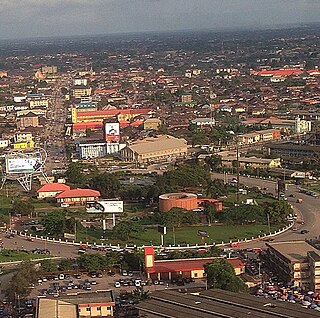
Benin City is the capital and largest city of Edo State, southern Nigeria. It is the fourth-largest city in Nigeria according to the 2006 census, after Lagos, Kano, and Ibadan. It is situated approximately 40 kilometres (25 mi) north of the Benin River and 320 kilometres (200 mi) by road east of Lagos. Benin City is the centre of Nigeria's rubber industry, and Palm oil production is also a significant industry.

Ilorin is the capital city of Kwara State located in the Western region of Nigeria. As of the 2006 census, it had a population of 777,667, making it the 7th largest city by population in Nigeria.
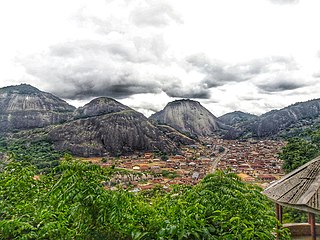
Ondo State is a state in southwestern Nigeria. It was created on 3 February 1976 from the former Western State. It borders Ekiti State to the north, Kogi State to the northeast for 45 km, Edo State to the east, Delta State to the southeast for 36 km, Ogun State to the southwest for 179 km, Osun State to the northwest for 77 km, and the Atlantic Ocean to the south. The state's capital is Akure, the former capital of the ancient Akure Kingdom. The State includes mangrove-swamp forest near the Bights of Benin.
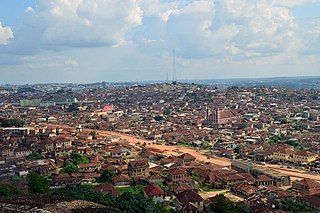
Ogun State is a state in southwestern Nigeria. As a Nigerian state, Ogun is the second most industrialised state after Lagos, with a focus on metal processing. It has good road and rail connections to the harbours in Lagos and Lekki. Wole Soyinka, winner of the Nobel Prize for Literature 1986, lives in Ogun.
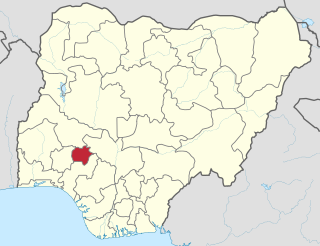
Ekiti State is a state in southwestern Nigeria, bordered to the North by Kwara State for 61 km, to the Northeast by Kogi State for 92 km, to the South and Southeast by Ondo State, and to the West by Osun State for 84 km. Named for the Ekiti people—the Yoruba subgroup that make up the majority of the state's population—Ekiti State was carved out from a part of Ondo State in 1996 and has its capital as the city of Ado-Ekiti.

The culture of Nigeria is shaped by Nigeria's multiple ethnic groups. The country has 527 languages, seven of which are extinct. Nigeria also has over 1,150 dialects and ethnic groups. The three largest ethnic groups are the Hausas that are predominantly in the north, the Yorubas who predominate in the southwest, and the Igbos in the southeast. There are many other ethnic groups with sizeable populations across the different parts of the country. The Kanuri people are located in the northeast part of Nigeria, the Tiv people of north central and the Efik-Ibibio are in the south South. The Bini people are most frequent in the region between Yorubaland and Igboland.
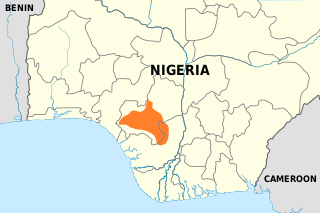
Edo, colloquially and often referred to as Bini, is the language spoken by the Edo ethnic group in Edo State, Nigeria. Benin is not a language but, rather, the name of the capital city, and the name of the Kingdom. Edo language is the native tongue of the Edo people and was the primary language of the Benin Empire and its predecessor, Igodomigodo for thousands of years. Edo language is the majority language spoken in Edo State, particularly in Benin City, and the surrounding local governments and senatorial districts in the Southern parts of the State. While everyone from the state are referred to as Edolites, but the Edo speaking people are known as the Edos.

Osun State, occasionally known as the State of Osun by the state government, is a state in southwestern Nigeria; bounded to the east by Ekiti and Ondo states for 84 km and for 78 km respectively, to the north by Kwara State for 73 km, to the south by Ogun State for 84 km and to the west by Oyo State, mostly across the River Osun. Named for the River Osun—a vital river which flows through the state—the state was formed from the southeast of Oyo State on 27 August 1991 and has its capital as the city of Osogbo.

Ikare is a town in the northern senatorial part of Ondo State, Nigeria.
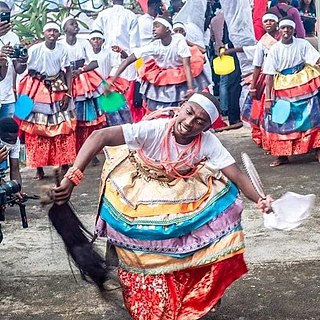
The Itsekiri are one of the Yoruboid subgroup of Nigeria's Niger Delta area, They speak a Yoruboid language and can be found in Delta State. The Itsekiris presently number 1 million people and live mainly in the Warri South, Warri North and Warri South West local government districts of Delta State on the Atlantic coast of Nigeria.
Òkè-Ìlá Òràngún is an ancient city in southwestern Nigeria that was capital of the middle-age Igbomina-Yoruba city-state of the same name.
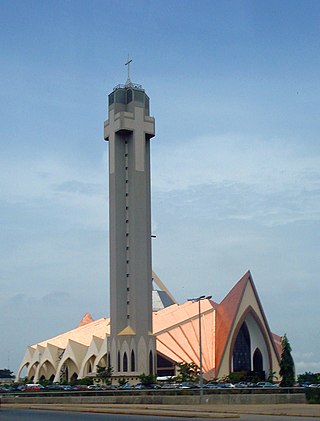
Religion in Nigeria is diverse. The country is home to some of the world's largest Christian and Muslim populations, simultaneously. Reliable recent statistics do not exist; however, Nigeria is divided roughly in half between Muslims, who live mostly in the northern region, and Christians, who live mostly in the southern region of the country. Indigenous religions, such as those native to the Igbo and Yoruba ethnicities, have been declining for decades and been replaced by Christianity or Islam. The Christian share of Nigeria's population is also now on the decline, due to a lower fertility rate relative to the Muslim population in the country.

Efon-Alaaye is a town in the Ekiti State of southwestern Nigeria, inhabited by the Yoruba people. The population in 1983 was over 100,000. It belongs to Efon Local Government, one of the largest local governments in Ekiti State.
Ilawe Ekiti is a town in Ekiti State, Nigeria. In 1995, the population was around 179,900. Its geographic coordinates are 7° 35' 60 N and 5° 5' 60 E.
Ile Oluji is a Local Government Area in Ondo State, Nigeria. Its headquarters are in the town of Ile Oluji.
Okitipupa is in Nigeria and part of the Ikale-speaking nation in Ondo State. Okitipupa Government headquarter is located in Okitipupa Major town with a university, Olusegun Agagu University of Science and Technology (OAUSTECH) which commenced academic sessions in 2010–11.
The Itsekiri language is a major branch of the Yoruboid group of languages, which as a group, is a key member of the Volta–Niger sub-family of the Niger–Congo family of African languages. Itsekiri is spoken by nearly 900,000 people in Nigeria as a first language and by many others as an additional language notably in the Niger Delta and in parts of Edo and Ondo states of Nigeria. The other key members of the Yoruboid group are Yoruba and Igala along with the various Yoruba dialects spoken in Benin and Togo.
The Idoani Confederacy is a traditional state based in the town of Idoani in the Ose Local Government Area of Ondo State, Nigeria. The origins of the state date back at least to 15th century, when the Oba Ozolua "the Conqueror" fathered the Alani of Idoani, which he made a vassal state of the Benin Empire.
Ipetumodu () is a city in Osun State, in the southwestern part of Nigeria. It is the headquarters of the Ife North local government. The city is under the leadership of traditional ruler with the title of Apetumodu, which means "one who killed an antelope for sacrificial purposes for Odu".
Ilara-Mokin is located in a central part of Ifedore local government of Ondo State, Nigeria. Ilara-Mokin is about 12 km from Ondo state capital, and has Ipogun, Ipinsa, Ikota, Ibule-Soro and Ero as neighbouring towns.














